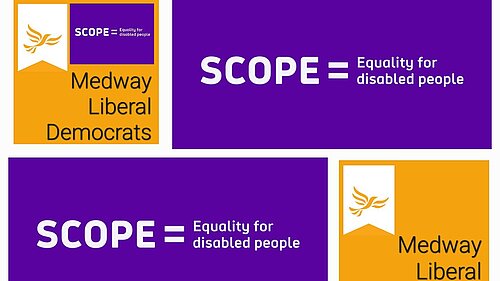Medway Liberal Democrats are supporting Scope's 'Let’s Play Fair' campaign, to increase inclusive playgrounds

Medway Liberal Democrats are concerned with research from Scope revealing 96% of parents with disabled children had used a public playground in the past year – with 49% reporting they had accessibility problems with these recreation areas. We know the importance of playgrounds for children for early childhood development and community integration for the whole family. Disabled children are no different.
We are urging Medway Council to recognise the need to improve our local playgrounds to achieve inclusivity for communities around Medway.
All children have a right to play and this should be reflected in the Medway's community play spaces and to embed principles of inclusive design to ensure that going forward, every development or refurbishment of a council playground considers inclusivity.
Alan Wells, spokesperson for Medway Liberal Democrats said, "This is such an important issue. It’s not just about removing barriers, that stop disabled children taking part but introducing opportunities that ensures that disabled children are included. We want to promote creativity and fun with playgrounds that all children can fully enjoy.
Play is so important to a child’s development; it feeds imagination and forms friendships. Playgrounds are spaces that allow children to be themselves and form many early memories. Imagine not being able to take your child out to the playground and having to watch your child shut out from making these early friendships, or just having fun. For many families with disabled children, this is the reality."
We want to ensure that Medway’s play equipment is inclusive and accessible to all children. All children should have equal access to playgrounds, and that needs all our support.
ENDS
Additional information and notes for editors:
SCOPE findings:
Half of parents surveyed by SCOPE reported facing accessibility problems with their local playground, and only 28 percent said they felt part of the community whilst at the playground.
49% of families with disabled children face accessibility problems with their local playground.
10% parents of disabled children said their child got hurt using inaccessible equipment.
Barriers like: lack of inclusive and accessible playground equipment, inaccessible pathways and tight spaces, challenging and uneven terrain. This limits choice and their child’s right to play. It’s unjust and unfair.
Why are inclusive playgrounds important?. Play is fundamental to a child’s development and wellbeing, and playgrounds help this. There are over 1 million disabled children in the UK. Through play a child can: learn, explore, stay active, make friends and socialise. Not being able to access these play spaces can increase exclusion and isolation.
We want to see: accessible equipment, sensory opportunities, appropriate surfaces and fences, these changes make play fun, safe and open to all children.https://www.scope.org.uk/campaigns/lets-play-fair/
As families with disabled children face rising costs of living, the need for free, inclusive playgrounds becomes more important than ever. But many disabled children are not able to enjoy their local playground as the space and equipment isn’t designed for them, leaving them and their families isolated. Inclusive play, when disabled and nondisabled children play together, offers a space for shared experience, enabling children to have equal status and provides the chance to break down social barriers.
Too many disabled children don’t feel safe in playgrounds
1 in 10 parents of disabled children said they did not feel their child was safe using the inaccessible equipment
1 in 10 parents said their disabled child hurt themselves because of inaccessible equipment.
Many parents and carers do not feel their disabled child is safe using playgrounds with inaccessible equipment, with some parents saying their child had been hurt because of equipment not being suited to their needs. The survey of 1,000 parents and carers of disabled children, found that many children are being denied fun, friendship and development opportunities, leaving many families isolated and excluded.
The fact that some parents do not feel their disabled child is safe in playgrounds is extremely alarming. Many playgrounds are not designed with disabled children in mind. For example, many have woodchip or sand floors which may be difficult for children with wheelchairs or walkers, and concrete floors are dangerous for children who are prone to falling.
